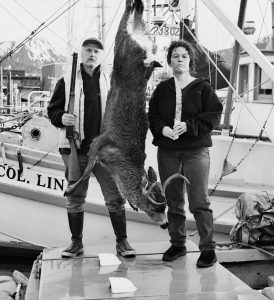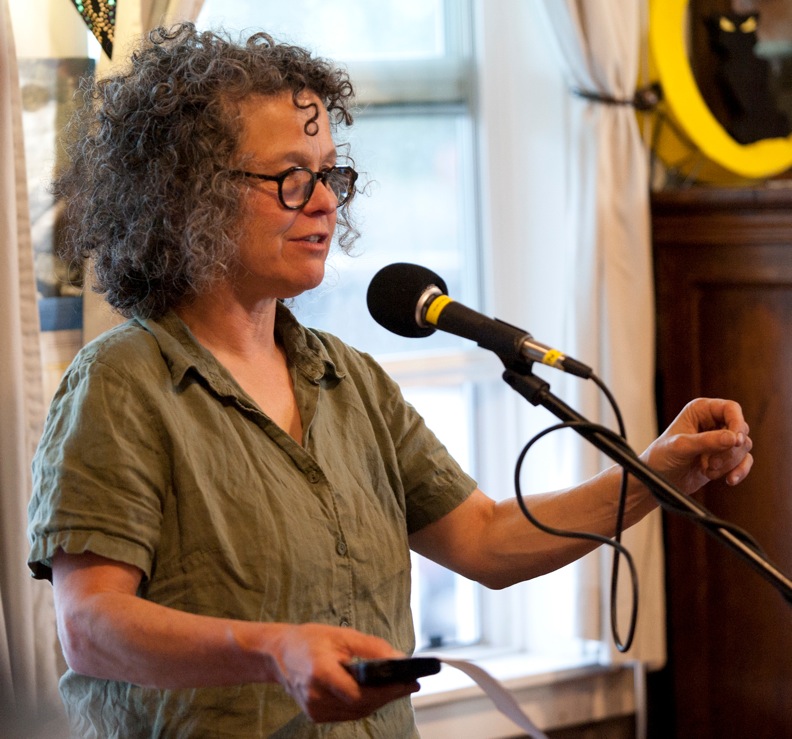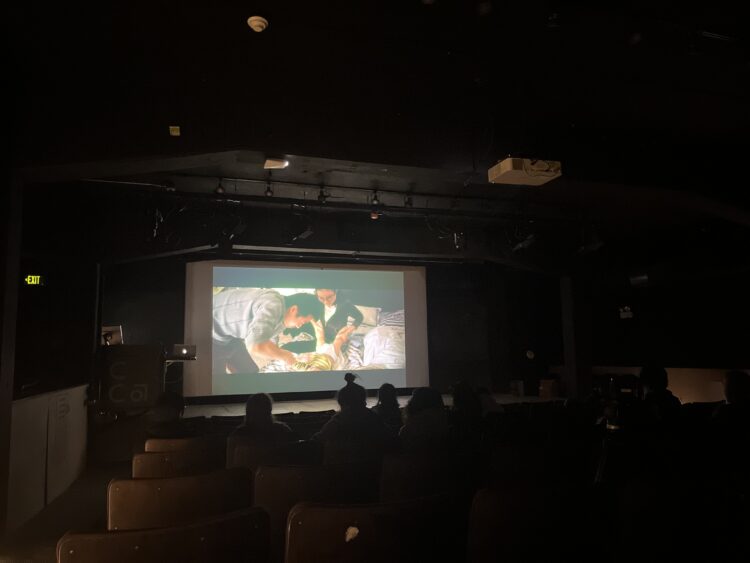Artists in Alaska: Ellen Frankenstein on Salmon and Filmmaking
Creative Capital is exploring the lives and practices of artists based in Alaska. Following a partnership with the Rasmuson Foundation, Creative Capital brought artists in the state its core of professional development courses. We’ve reached out to a few of the people who took Creative Capital professional development through Rasmuson. Now we hear from filmmaker, Ellen Frankenstein, who shared with us how cooking a piece of salmon properly involves many of the same principles as a sustainable art practice.
Ellen Frankenstein: I admit, I let the King salmon, in the smokehouse about fifteen feet from my backyard studio, get overdone a few days ago. Also, close-by: a chicken coop, hand built out of local wood, with six Araucana hens who never hesitate to announce when they’ve laid an egg and several garden beds crowded by salmon berry bushes and filled with kale, peas and potatoes. I was editing and writing and forgot to check the smokehouse.

Ellen Frankenstein and Spencer Severson, from the film, “Eating Alaska.”
Hillary Bonhomme: What’s the short story of what you’re working on now?
Ellen: I’m currently working on a project, called 14 Miles: Dispatches from an Island in Alaska. It is set within a time and place and a quest to think about what is normal in a time that feels, for lack of better words, “off-kilter.” A local archivist, now ninety-two years old, warns me that I can’t create a framework that comprehends the present because what is happening now is not history yet. Nevertheless, I’ve been collecting scenes including one with students in a U.S. Government Class studying the executive branch, as they always do, and writing President Trump letters, which they’ve never done. There’s a local pharmacist changing the store front window display from winter to spring, sharing her concerns over the troubled local economy, stopping to chat with a local passerby. Then there is the new family marijuana business run by a Tlingit ex-law enforcement agent. If 14 Miles resonates as a whole, these chapters, with serious and wry moments, will come together to create a sense of place and how it connects, and doesn’t, to the world beyond.
Dear Mr. President (Part 1) from Artchange, Inc. on Vimeo.
Hillary: What brought you to Alaska? Was location deeply embedded into your work?
Ellen: I came to Sitka, a town of about 8,800 on an island in the panhandle of Alaska, from Los Angeles. to collaborate on a documentary film. One thing, as the cliché resonates, led to another. Eventually, even the piles 16 x 24” black and white prints, boxes of three-quarter inch tapes and outtakes from film projects from a storage locker on Hollywood and Vine joined me. Also, just after the fog lifted and a brown bear walked away from a hill 45 minutes by boat out of town, I married my hippy conservationist Sitka based commercial fishing husband.
Regardless of location, I have always been bent towards social issues. The environment here, so different from what I’d experienced before landing here, underlies work, play and daily life. This place is more beautiful than the postcards can make it, with misty clouds ringing the mountains, eagles circling and whales bubble feeding when the herring return in the spring, and towering old growth spruce, hemlock and yellow cedar trees.
It is also a place where I know that one way to get kids talking when I’m working as a visiting artist in the schools around Alaska, is to ask for stories of getting stuck or stranded. Living on an island in a state that covers a lot of geographies, with a relatively small population, has allowed me to work with people over time. The environment, the arts, the indigenous community, are intertwined here and that too has shaped me, my relationships and my work.
Tracing Roots: Delores Churchill–A Weaver’s Journey Trailer from Artchange, Inc. on Vimeo.
Hillary: What’s been a challenge you’ve faced in Alaska, that you imagine many working artists have to overcome?
Ellen: Over the years, I’ve thought a lot about isolation. Even with all the beauty, it’s challenging at times to be here. After all, this is an island. You have to take a plane or boat to get here. The arts scene, from some angles, can seem safe and not strong on pushing boundaries. Meanwhile, since the pulp mill closed the town in the mid 90’s, Sitka has been gentrifying. It’s become a lot less blue collar than it once was, including a flow of interns, fellows and young college educated energy. It is fun to see the newer generations discover the place and to witness new things happen, but also troubling to see locals not being able to afford to live here.
I’m thankful to the Rasmuson Foundation for supporting and recognizing the work of individual artists in Alaska and for partnering with Creative Capital. I was excited to attend the professional development workshop and also look forward to diving into the online courses. For one it was a joy to sit at the table with such a powerful group of artists from around the state, including Earl Atchak, a Yupik Mask maker, Erin Hollowell, a non-native poet working on her third collection of poetry and Itzel Yarger-Zagal, a bilingual poet, focusing on her experiences emigrating from Mexico and the stories of other migrants in Anchorage. I came away from the workshop with a heightened perspective on what it means to be a sustainable artist, to sustain yourself and do your work.
My handwritten scrawls from the workshop include these words from Beverly McIver: “Voices steal joy…continue to do work…reach back. Don’t assume want to be at the top of things.” And this from Colleen Keegan: “take chaos out of what is not creative…. who do you really want to work with going forward?” There were specific pointers and lessons on productivity, fundraising and business plans that I will make use of for both my own projects and projects that partner with, Artchange, Inc., the small nonprofit I direct. I wanted to end on my own self-plea to say “No.” I’ve spent many of the last years jumping at opportunities, be it a collaboration with a nonprofit, a free-lance gig or an invitation to screen a film. I’m ready to do less and do it more intentionally. Then maybe the next batch of salmon won’t be so dry and chewy,

Ellen Frankenstein hosting “Sitka Tells Tales:” a local live storytelling series.
Photo courtesy of the Daily Sitka Sentinel, James Poulson
Click here to learn more about Creative Capital’s upcoming online courses for professional development for artists. To read more about Rasmuson Foundation, click here.
Ellen Frankenstein is an independent filmmaker and media artist. She directs the non-profit, Artchange, Inc. Frankenstein’s films include: Tracing Roots, Eating Alaska, No Loitering and Carved from the Heart. She distributes these documentaries with the New Day Film, a filmmaker run distribution company, providing social issue media to educate and inspire.
